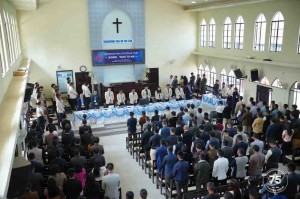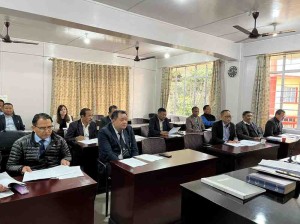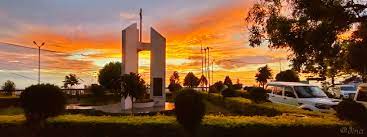It is a great honour for me to write the history of Women’s Ministry. However it is a little embarrassing for I would not be able to present fully the tremendous efforts rendered by the mizo Baptist women in the Lord’s service in this concise article. As we proceed, we will look at the position of women in the mizo society before the coming of Christianity to Mizoram and then move on to see how the lives of women are transformed when Christianity was brought to them.
I. Position of Women in the Mizo society before the advent of Christianity: In the olden days, women were very much looked down upon by the mizo society. They were regarded as half human, just above the animals. Whenever a girl child is born, they blessed her to get a mithun for a bride prize when she marries. Since women have no status in the society, no man should have any likeness of a woman. If there is any likeness of a woman in a man, they would call him ‘Coward’ and would tell him to wear woman’s dress.
Even in the family, a woman has no status or authority. They were not to mingle with other people. The only time they can associated themselves with friends were on their way to the village waterhole when they go together to fetch water for their household use. For this there is a saying,” The wisdom of woman does not reach beyond the waterhole”, disparaging whatever wisdom a woman may have. A woman also does not have any religion. They are supposed to follow whatever religion their husband may follow. For this, it is said,” Women and crabs have no religion”. It is also the custom of the mizo society not to take the words of women seriously, saying, and “Women’s word is no word just as a crab meat is no meat”. The mizo women have no right to speak out on any matter.
However they bear great responsibilities in the household. They would get up early in the morning, bringing water from the village stream, they would husked the rice and cook food for the family. They worked from dawn to dusk. Even at night, a woman would work on her loom and prepare food for their domesticated animals, such as pigs. They hardly have any time for leisure.
II. Position of Women During the Advent of Christianity: The position of women during the advent of Christianity was not much better. They were given no respect in the society. The position of widows was much worse. Whenever a new land is selected for cultivation, widows were the last to choose a land for their yearly cultivation. Even in marriages, girls would hardly be given the freedom to choose their life long partner. Parents married off their daughters without the consent of the girls. Many a girls were married off with tears in their eyes.
When the missionaries came to us, there were some women among the first converts who were resolute and bold in their endeavour. Noteworthy among them were – Pawngi, Hlunziki and Challianbuki. Before 1907, no women attended school. In that year, Rev.J.H.Lorrain (Pu Buanga) opened a school for girls and a few girls were enrolled in it. However these girls were ridiculed by the people, saying,” Shameless girls, they would never find a suitor”. So, they were despised and maltreated in the society. Hence only a few of them dare to attend the school. In 1919, Miss E.M.Chapman (Pi Zirtiri) and Miss M.Clark (Pi Zolawmi) joined the first missionaries at Serkawn. They reopened a school for girls. Since there were lady teachers, the enrollment was much higher than before. Thus it paved the way for the emancipation of women in the mizo society.
III. The Beginning and Growth of Women’s Ministry: When Miss E.M.Chapman (Pi Zirtiri) and Miss M.Clark (Pi Zolawmi) reopened a school for girls, it hastened the emancipation of women in the society. It also opened a new opportunity for women to get involved in the Lord’s ministry.
- Women Evangelists: In 1919, a presbytery meeting at Thiltlang passed a resolution allowing women to work as evangelists. The resolution says,” If there are, even among women, who are dedicated and able, we resolved that they be allowed to work as evangelists”. Their salary was fixed at Rs 5 (Rupees Five) per month, and that it should be given from the money that the church had received through the collection of a handful of rice, which every Christian family had given. Henceforth, in 1920, the first woman evangelist, Dokungi of Aithur village was appointed. After her, three other women were chosen by the presbytery to work as evangelists. The following are the names of women evangelists.
Name Village Date of appointment / Tenure 1. Dokungi Aithur 1 April, 1920 – 2. Lalthlauvi Serkawn 1 April 1921 – 1925 3. Lalchani Khawhri 1 January 1922 – 1928 4. Chalchhingi Keltan 12 October 1922 – 1931
Apart from the above mentioned evangelists, Thangzingpuii worked in her village as an evangelist bearing her own expenses. The presbytery meeting of 1931 confirmed her as a full time evangelist. She was asked to assist the pastor who was in charge of the pastorate under which her village falls. She was given Rs 5 per month as salary. The presbytery also framed guidelines that the women evangelists have to follow. These guidelines are given below:
1) To assist women in child birth. 2) To minister to the sick. 3) To learn the Scripture so as to teach other. 4) They would be assigned an area for their ministry, however they were also allowed to preach outside their area. 5) They should spend at least 70 days in a year for evangelistic tours.
With the above guidelines, the women evangelists zealously engaged themselves in the ministry. From the records, the women evangelists were employed till 1931.
2. Women in Presbytery meeting: The Women evangelists worked earnestly. Their ministry was growing year by year. In 1938, Girls’ Auxiliary was introduced and in 1947 mothers’/women’s’ Fellowship was founded. During this time, when the ministry of women was growing rapidly, they felt the need to acquaint themselves with the larger ministries of the church. For this, at the Presbytery meeting at Pukpui Village as on 10-15 March 1948, they submitted a letter beseeching the presbytery to allow them to send a representative to the meeting. The Presbytery consented their request. They then sent Pi Chhumi as their representative at the meeting. Because of this, from 1949 women were represented in the Presbytery and in the Pastorate Council Meetings However, the elders of the Local Churches were assigned to carefully select women who would be in the meetings.
3. Women Church Elders: For along time, no woman is elected as church elder. But on 9-14 March 1949, a presbytery meeting at Lunglawn deliberated about electing women as church elders. The meeting resolved that ‘In regards to the election of church elders, there should be no discrimination on the basis of sex. If there are among women who are able and admirable, let them be elected and those who are elected should be allowed to attend the presbytery meeting. It was Pi Chhunmawii of Zotlang who was elected as a Church elder for the first time among the women. She was elected in 1952. We still have been electing women as church elders. Till today the BCM had ordained 17 women as Church elders. Among them four had been promoted to Glory. The following are the names of women, who were elected as Church elders:-
| SL No. | Name | Village | Years |
| 1 | Upa Chhunmawii (L) | Zotlang | 1952 |
| 2 | Upa Lalhluti | Bualpui (H) | 1955 |
| 3 | Upa Hrangdawli (L) | Thingsai | 1956 |
| 4 | Upa Hranghnawli (L) | Thingsai | 1961 |
| 5 | Upa Kapveli | Kawlhawk | 1962 |
| 6 | Upa Lalzawni | Vanhne | 1971 |
| 7 | Upa Lalchhingi | Bualpui (NG) | 1979 |
| 8 | Upa C. Remmawii | Serkawn | 1987 |
| 9 | Upa Tialpeni | Lungpher | 1988 |
| 10 | Upa Lalthuami | Sazaikawn | 1991 |
| 11 | Upa LH Liannguri | Phairuangkai | 1993 |
| 12 | Upa Lianzingi | Lungdai | 1993 |
| 13 | Upa Lalhmingliani (L) | Hnahthial (Electric) | 1994 |
| 14 | Upa Dengkhumi | Denlung | 1996 |
| 15 | Upa Hrilveli | Pangkhua | 1996 |
| 16 | Upa P. Lianngengi | Aizawl (Electric) | 2000 |
| 17 | Upa Lalnunthari | Rotlang (W) | 2000 |
| 18 | Upa C. Chhawnziki | Muallianpui (N) | N.A.? |
4.Women Theologian : The first women who had taken a degree course theological training were C. Remmawii of Chawnhu village and M. Zangeni of Thingsai village. Before them no women in the history of the Mizo Baptist Church had any theological training at a degree level. These two ladies completed their B.Th course in 1975. They took up ministries under the Church. However, one of them left the Church for family reasons. As time passed, now we have about 20 women who had theological training. The following are the names of our women theologians.
| Sl | Name | Village | Degree | College |
| 1 | C. Remmawii | Chawnhu | B.Th | ETC Jorhat |
| 2 | M.Zangeni | Thingsai | B.Th | ETC Jorhat |
| 3 | H. Lalhmingthangi | Muallianpui | B.D/M.Th | UBS Yavatmal |
| 4 | R.Zothansiami | Zohnuai | B.Th | ETC Jorhat |
| 5 | H.Lianchhungi | Theiriat | B.Th | ETC Jorhat |
| 6 | F.Lalrotluangi | Thingsai | B.D | ETC Jorhat |
| 7 | S.Thanchhungi | Chanmari (LLI) | M.Th | UBS Bangalore |
| 8 | H.Lalkimi | Thingsai | B.Th | ETC Jorhat |
| 9 | M.Lalthanzuali | Hnahthial | B.D | UTC Bangalore |
| 10 | Daisy Zomuani | Shillong | B.D | ETC Jorhat |
| 11 | P.Lianngengi | Lunglawn | B.R.E. | UBS Yavatmal |
| 12 | J.Vanlalpani | Zotlang | B.Th | ETC Jorhat |
| 13 | Rebeki Khiangte | Kawrthah | B.Th | ETC Jorhat |
| 14 | B.Singpari | Paithar | B.D | ETC Jorhat |
| 15 | P.S.Lalhmingthangi | Zobawk | B.Th | ETC Jorhat |
| 16 | R L Hnuni | Bungtlang | D.Th | Senate of Serampore |
| 17 | F. Lalchhanpuii | S. Vanlaiphai | B.D | ETC Jorhat |
| 18 | J. Lalvarliani | Paithar | B.D | Senate of Serampore |
| 19 | Lalrengpuii | Bazar, Lunglei | B.D | AICS |
| 20 | Rohmingliani | Ramthar, Lli | B.D | AICS |




